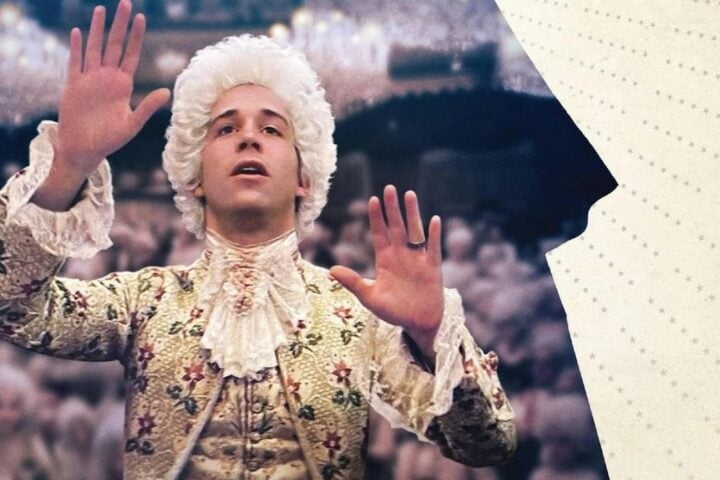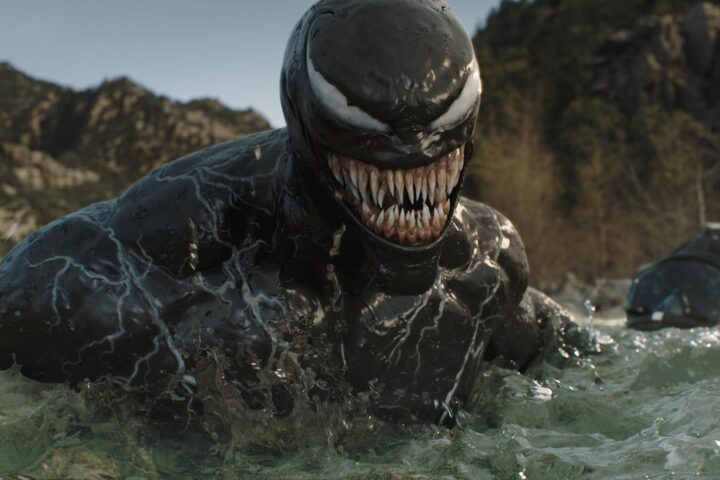“It is what it is,” says David (Ewan McGregor) in Niclas Larsson’s adaptation of the novel Mamma i soffa. The “what” he’s referring to is the fractured state of his family, in which each of three estranged siblings has a different, yet equally absent, father. “Sometimes it isn’t,” counters Bella (Taylor Russel), a young woman who minds the furniture store where David’s mother (Ellen Burstyn) has planted herself on a couch and refused to budge.
There’s a naïve wisdom to Bella’s response. Family, on the face of it, is a classic case of things being what they are, as nobody chooses their biological parents or siblings. The questions, then, that the film sets out to probe are: When isn’t family what it is, and where?
In Mother, Couch, the “where” is a family-owned furniture warehouse. Oakbeds occupies an otherwise derelict strip mall, its showrooms made to resemble surrogate homes—not too-modern, too-curated-to-be-real homes but with all the clutter and disarray that home entails. And if the showrooms seem inhabited, that’s because sometimes they are, as Oakbeds invites its customers to stay overnight, an invitation that David’s mother takes to heart.
That’s where the “when” comes in. When David and his burn-out brother, Gruffudd (Rhys Iffans), can’t persuade their mother to leave with them, their perpetually smoking sister, Linda (Lara Flynn Boyle), enters the fray, resulting in an extended therapy session, with the siblings compelled to speak to one other to resolve the enigma of their mother’s intransigence.
Matching the eccentricity of the film’s setting, cinematographer Chayse Irvin’s images are steeped in warm, melancholic sepia tones, rendering the absurdism-lite of the premise as comfy, as vintage as the couch at hand. There are moments of rupture, though, when scenes cut off mid-sentence or even mid-word, or the humor blackens (as when David’s mother tells him that she never wanted children, or how many abortions she’s had), or when the jazz score goes all jittery to echo David’s anxiety, as he tussles with the contradiction that trying to be a good son makes him a bad father. The center of the “family man” he strives to be cannot hold.
Mother, Couch is full of humdinger lines, as when David’s mother says, “You don’t stab someone in the back…not even family.” That, it turns out, is a real Chekhov’s gun of a line. But what makes Larsson’s script so memorable is the sheer amount of non-communication and dysfunction it packs in. David’s dialogue, especially, is rife with halting, awkward, yet sincere attempts at making himself understood. Grating, perhaps, but it comes off as refreshingly relatable in a medium that tends to favor artificially naturalistic dialogue.
As an adaptation, the film’s wordiness, charming as it may be on a line-by-line level, somewhat detracts from its cinematic potential. With the ending, the cliché of the failing business as a “sinking ship” is literalized when a downpour turns the parking lot an ocean, and the couch is repurposed as a funerary boat when David’s mother casts out to sea, never to return. After the funeral, David and his siblings, reconciled by grief, find the same couch floating in a lake.
It all comes off a little too tidy and sentimental to accept at face value, in the wake of the absurdity that precedes it. It’s possible to point at this or that fissure in the real and identify what it symbolizes exactly, subordinating absurdity to a mere metaphor, or worse, kitsch. The effect is comparable to a horror movie explaining at the last moment where the monster comes from and why it’s on a rampage, sabotaging the mystery that makes it scary in the first place. Other than a sort of wistful quirkiness, it’s not clear what Mother, Couch gains by skewing away from a more straightforward, streamlined family drama. Unfortunately, and despite appearances to the contrary, the film ultimately “is what it is” a little more than it tries to be.
Since 2001, we've brought you uncompromising, candid takes on the world of film, music, television, video games, theater, and more. Independently owned and operated publications like Slant have been hit hard in recent years, but we’re committed to keeping our content free and accessible—meaning no paywalls or fees.
If you like what we do, please consider subscribing to our Patreon or making a donation.




